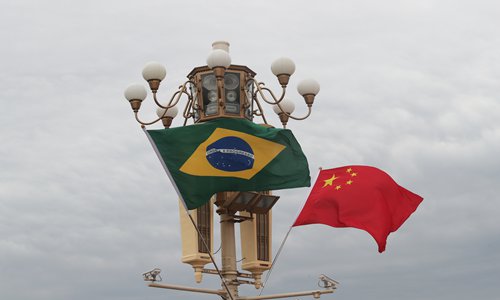Brazilian politicians' tricks to hype Taiwan question doomed to fail: expert
By Leng Shumei Source:Globaltimes.cn Published: 2020/5/27 3:34:27

File Photo: IC
Some Brazilian politicians' tricks to scapegoat China for a rapidly worsening epidemic situation in the country by hyping the Taiwan question is doomed to fail, Chinese experts said Tuesday, stressing solid China-Brazilian cooperation and relations.
Respect for the one-China principle is the basic premise and cornerstone for China's relationship with other countries, Chinese analysts stressed. Brazil and China established diplomatic ties in 1974.
The remarks came after Paulo Eduardo Martins, a Brazilian Congress member posted a photo of a document allegedly from the Chinese Embassy on his social media platforms on Tuesday.
He claimed that the document was a letter the Chinese embassy had sent to Brazilian parliamentarians, recommending the latter not congratulate Taiwan leader Tsai Ing-wen for her inauguration on May 20. The letter was issued on May 13, according to the post.
Recently, some Brazilian politicians have attacked and smeared China on the COVID-19 pandemic. Tsai's inauguration was just the latest issue they have tried to make use of to shift Brazilian people's attention from the rapidly worsening epidemic in the country, Wu Hongying, director of the LatAm office of the China Institutes of Contemporary International Relations, told the Global Times on Tuesday.
"But the trick is doomed to fail. Neither will it affect the solid and close China-Brazilian ties, which is not only promoted by both governments but hailed by people on both sides," Wu said. She noted that the Brazilian government has always respected the one-China principle.
Taiwan authorities noticed the posts and interacted with Martins on social media platforms. The issue attracted some radical anti-China elements in Brazil and on the island, some of whom even started a hashtag on Twitter #VivaTaiwan, which soon started to trend.
Tsai also released a post on her Twitter account late Tuesday with a hashtag #VivaBrazil.
The issue came about two months after Brazilian Federal Deputy Eduardo Bolsonaro, son of President Jair Bolsonaro, groundlessly blamed China on Twitter for the spread of the novel coronavirus, following US President Donald Trump's "Chinese virus" tweet.
Rodrigo Maia, President of the Chamber of Deputies of Brazil, apologized in a tweet for the controversial tweet mentioned above, noting that "this attitude does not match the importance of the Brazil-China strategic partnership and our diplomatic ties."
China has remained the biggest trading partner of Brazil for years.
In 2019, the value of bilateral trade between China and Brazil was $98 billion. Brazil's exports to China totaled $63 billion in the same year - 28 percent of Brazil's total yearly exports - followed by the US of $30 billion.
The number of confirmed COVID-19 cases in Brazil had reached nearly 380,000 as of 7:30pm Tuesday, ranking it as the world's second-most affected nation following the US.
Yang Wanming, Chinese Ambassador to Brazil, explained in an interview with China Central Television on May 16 that the abrupt outbreak was related to continuous population movement between Brazil and American and European countries where the virus was spreading in the early stages of the pandemic. Brazil did launch strict measures to prevent and control a domestic epidemic, Yang said.
Chinese analysts pointed out that a limited healthcare system in Brazil is another reason why the Brazilian government has found it difficult to control the epidemic.
Enhanced cooperation on anti-epidemic work is currently a major part of China-Brazilian cooperation, Yang said, noting that China is willing to support Brazil to overcome the epidemic.
According to Yang, the Chinese embassy has been actively communicating with Brazilian authorities and has invited Chinese medical experts who had been on the frontlines in Wuhan and other places in Hubei to share China's experience in combating the epidemic with them via online conferences.
Chinese companies in Brazil have also donated a large number of medical materials, including ventilators, virus testing kits, protective suits and masks, to different places in Brazil.
Posted in: DIPLOMACY